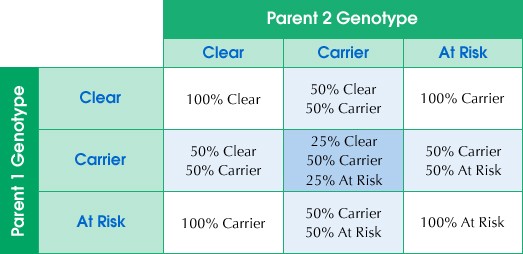What is degenerative myelopathy in German Shepherd Dogs?
Degenerative myelopathy (DM) is a chronic spinal cord condition characterized by progressive deterioration of the spinal cord. DM occurs most commonly in German Shepherds, Pembroke Welsh Corgis, Boxers, Rhodesian Ridgebacks, and Chesapeake Bay Retrievers, but it has been reported in several other breeds of dog. This disease is not uncommon in some pure bred dogs with an overall prevalence rate of 0.19%.
Interpreting results of this genetic disease
Normal (n/n)
This dog is homozygous N/N, with two normal copies of the gene. In the seven breeds studied at the University of Missouri in depth so far, dogs with test results of N/N (Normal) have never been confirmed to have DM. This dog can only transmit the normal gene to its offspring, and it is unlikely that this dog or its offspring will ever develop DM.
Carrier (a/n)
This dog is heterozygous A/N, with one mutated copy of the gene and one normal copy of the gene, and is classified as a carrier. In the seven breeds studied at the University of Missouri in depth so far, dogs with test results of A/N have never been confirmed to have DM. While it is highly unlikely this dog will ever develop DM, this dog can transmit either the normal gene or the mutated gene to its offspring.
At-risk (a/a)
This dog is homozygous A/A, with two mutated copies of the gene, and is at risk for developing Degenerative Myelopathy (DM). The research has shown that all dogs in the research study with confirmed DM have had A/A DNA test results, however, not all dogs testing as A/A have shown clinical signs of DM. DM is typically a late onset disease, and dogs testing as A/A that are clinically normal may still begin to show signs of the disease as they age. Some dogs testing A/A did not begin to show clinical signs of DM until they were 14 years of age. Research is ongoing to estimate what percentage of dogs testing as A/A will develop DM within their lifespan. At this point, the mutation can only be interpreted as being at risk of developing DM within the animal’s life. For dogs showing clinical signs with a presumptive diagnosis of DM, affected (A/A) test results can be used as an additional tool to aid in the diagnosis of DM. Dogs testing Affected (A/A) can only pass the mutated gene on to their offspring.
Guidelines for Breeding

